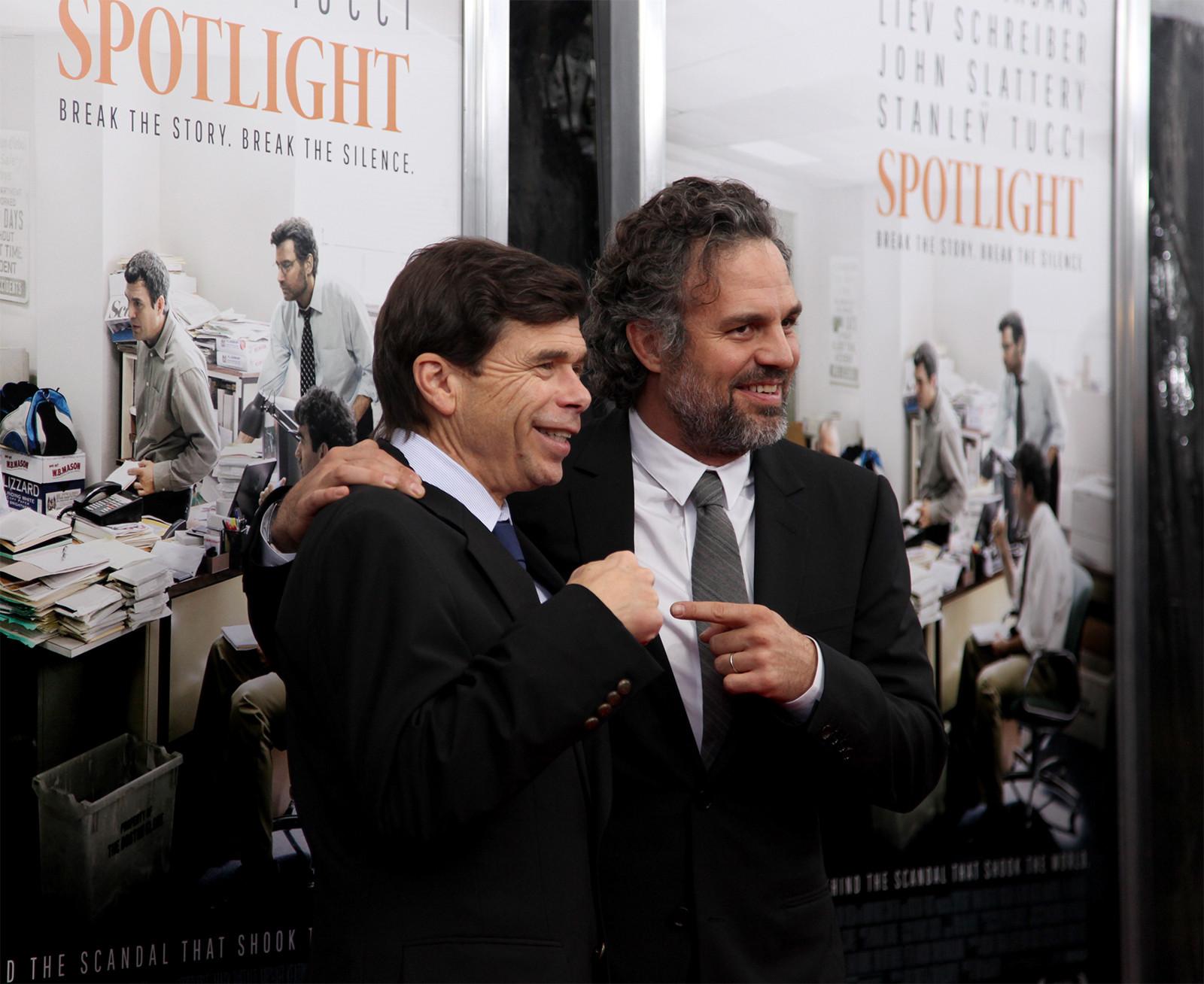[mediagrid cat=”24135″ size=”full”]
Several times throughout “Spotlight,” the reporters and editors digging up the Catholic Church’s buried history of child sexual abuse question how such biblical evil could have stayed so hidden for so long. “This story needed Spotlight,” they reassure each other. The statement is the biggest cinematic delusion in years.
The film opens on the titular quartet of Boston Globe investigative journalists, fresh off a teaspoon of a scoop and struggling to justify scrubbing for a new one. When Marty Baron (Liev Schreiber) takes a seat at the Globe editor’s desk, a tentative break emerges. Baron, late of the Miami Herald and a newcomer to the infamously insular city of Boston, immediately picks up a recent Globe column on the ousted Rev. John Geoghan and begins asking the questions he doesn’t know not to ask.
Why was Geoghan shuffled to different parishes with each charge against him, rather than removed sooner? More importantly, why were the documents chronicling Geoghan’s arbitrations sealed from the public eye? The first step, Baron gruffly explains, will be to petition the courts for access to those documents. In other words, the Globe needs to sue the Church. Sounds like a job for the Spotlight team.
With that, “Spotlight” unspools into a love letter to and master class in investigative journalism. As is usually the case, though, there’s more to the story. What makes the film as troubling as it is inspiring is how slyly it denounces us for needing the practice in the first place.
None of that is to say that the team’s work is in any way glamorized. Our introduction to the Spotlight team shows them carrying Styrofoam plates of cake to their basement office and nestling in among the tube monitors and Bankers Boxes. Mike Rezendes (Mark Ruffalo) brushes off small talk about work’s toll on his marriage before we see him boiling hot dogs alone in a sad one-room apartment. In fact, the behind-the-scenes struggles in “Spotlight” go largely unexplored, mostly because they have no bearing on the fire that burns beneath the team’s chino-ed rears. Like Woodward and Bernstein were described in their own film, “they’re hungry,” and only the job will sate them.
Ruffalo is the best example of this. Something of an unabashed goober on the surface, his Rezendes is the one leading the charge. Even while shaking down the survivors’ advocate Mitchell Garabedian (Stanley Tucci), which is by no means a pleasant feat, Rezendes keeps his thumbs in his belt loops and a sheepish smile across his face. He is the proverbial golden boy, the grateful and enthusiastic workhorse that the industry, shadowed by staff cuts even in 2002, needs so badly.
For their parts, Rezendes’ colleagues Sacha Pfeiffer (Rachel McAdams), Matt Carroll (Brian d’Arcy James) and team captain Walter “Robby” Robinson (Michael Keaton) all chase their own respective leads with marginally less glee, but no less vigor. Together, they do it all. Over the 128-minute runtime, the Spotlight team combs data, sprints to court, confronts clerks and pulls damning leads from unwilling or unwitting sources. At the very least, it’s a lot cheaper than J-school, and four years shorter.
But that play-by-play comes at the expense of color commentary. That the story steers so clear of the reporters’ personal lives — if Rezendes’ family doesn’t show up among the Blu-ray deleted scenes, then all the worse — wouldn’t be so glaring if it didn’t leave their motivations ambiguous. As character traits go, pure altruism isn’t sufficient — it’s a little lazy.
It’s also not plausible. Very few characters are true bystanders to the scandal, and none of the four “lapsed Catholics” on Spotlight is included. That realization grows bigger with every new clue uncovered, first planted in a conversation between Rezendes and Garabedian. Garabedian explains that the reason he took on the responsibility of representing so many abused survivors is that, as an Armenian American, he felt none of the divine fealty to the Catholic Church that most Bostonians do. “Boston is still a small town,” it’s said at one point. Given that, Garabedian is a lot like Corey Stoll’s brief turn as an imported U.S. prosecutor on the Whitey Bulger case in the season’s other tale of Boston’s blindness to badness, “Black Mass.” Given that, he’s a lot like Marty Baron. They’re all outsiders.
But what of the insiders? As the web comes undone, so too does everybody’s presumptions of innocence. The biggest finger “Spotlight” points isn’t at the church, but at the parish. As one frustrated character proclaims near the emotional climax of the film, “It’s like everybody already knows this story,” and as underreported articles uncovered from past Metro pages suggest, somebody at the Globe knew, too. If the extent of the abuse was so far-reaching in a community so close-knit, who among the faithful was still watching God? Cue the shot of boys riding bikes past a priest’s house. Cue the children’s choir, singing “Silent Night.”
The movie begins with a brief scene in 1976 with a priest and two boys quietly sitting in separate rooms of a Boston police station. A different priest assures the boys that what happened to them won’t happen to anyone else. Two officers follow, disturbingly familiar with what’s unfolding. As both clergymen leave, climbing like gangsters into the back of a black Lincoln, one officer asks about the first priest’s arraignment.
“What arraignment?” scoffs the other.
The big secret that Spotlight uncovered, then, evidently wasn’t the secret we want to believe it is. The story didn’t need Spotlight. It just needed someone.
“Spotlight” opens in Boston theaters on Friday.

















































































































